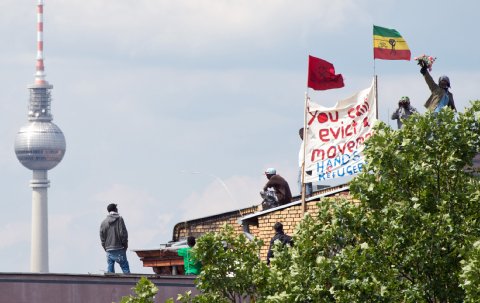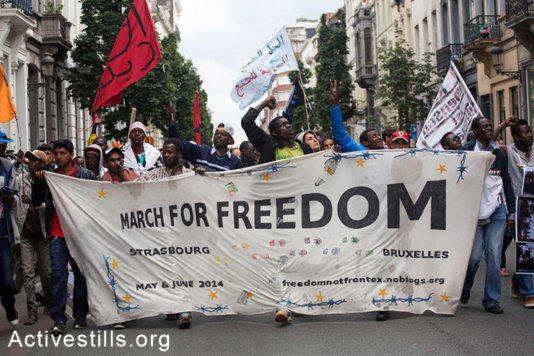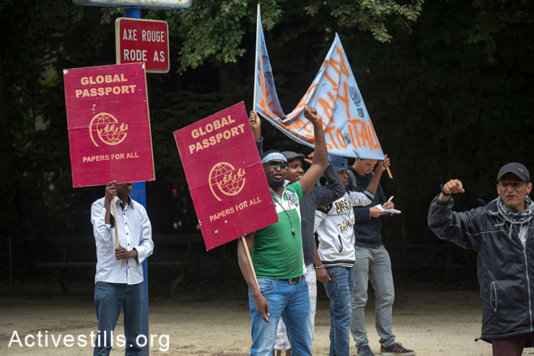- About
- Topics
- Story
- In-Depth
- Picks
- Opinion
- News
- Donate
- Signup for our newsletterOur Editors' Best Picks.Send
Read, Debate: Engage.
| July 28, 2014 | |
|---|---|
| located: | Germany, France, Hungary, Greece, Italy, United Kingdom |
| by: | Narod Cahsai |
The March for Freedom has been one of many in recent months. Across Europe people have expressed their solidarity with the refugee movement in form of political protests. It has been some of the biggest and most visible protests by asylum seekers in Europe to date.
Refugees across Europe are united in a common struggle. They want to have full access to their human rights. The freedom of movement, the right to seek employment or education. The abolishment of the requirement for refugees to live in designated (usually remotely located, isolated and prison-like) encampments and an end to all deportations.
Most of the protests have mainly been organized by refugees themselves and supported by activists and other supporters. This recent phenomenon of "refugee activism" has created a public awareness of the precarious situation for refugees in Europe. The emergence of this growing movement has already influenced mainstream debates across Europe.
Following the Refugee Protest in March 2012 to Berlin, the capital of Germany has emerged as the epicenter for the political resistance of refugees. Berlin stands exemplaryfor the refugee dilemma in Europe.
After the notorious refugee protest camp at "Oranienplatz" had been evicted in April this year, a nearby occupied school buildung (Gerhart-Hauptmann-School) became the new home and protest camp for many refugees. In the end between 300 and 400 refugees, Roma families and other homeless people were living in the occupied building under critical hygienic conditions.
The district government were once again unable to cope with the situation and therefore ordered the eviction and relocation from the former school buildung. In an attempt to evict the refugees and other inhabitants from the building, more than 1,000 police-officers turned the area around the "Reichenberger Kiez" (in Berlin-Kreuzberg) into a police state.
Intimidated by the massive police presence most residents were encouraged to leave quickly. Some of the former inhabitants were not allowed to bring along their spare belongings. On top of that some didn't even get access into the promised new housing facilities and are now forced to live out on the streets.
Therefore forty refugees decided to lift their protests to the next level. They staged a roof-top protest against their imminent eviction, threatening to jump if the police tried to storm the roof. The refugeesdemanded the right to stay and to maintain the school as a self-organized political space for refugees. The police responded by sealing off four blocks around the school and completely restricted access to the public and media.
The refugees have been warmly supported by locals and activists. Sit-ins, student-strikes, demonstrations and other forms of non-violent resistance were heavily held during the siege. The occupied neighbourhood was filled with slogans like "Refugees Welcome", "No Person Is Illegal," or "Repeal Compulsory Residence". Hundreds, at times thousands, of people took a stand for the political demands of the refugees.
Finally, on July 2nd, the eight-day long siege came to an end, leaving the taxpayer with a bill of five million Euros, for an inept police-operation that no one wanted in the first place. In the end the district government granted the refugees permission to stay in one part of the abandoned school building, on condition that no-one else would move in.
This outcome would not have been possible without the courageous support of refugee- activists, local residents and solidarity initiatives all over town, highlighting the recent phenomenon of "refugee activism". There might be even a glimpse of hope that a transnational refugee movement with real political power is in sight, challenging the European and right wing refugee policies and narratives.
By copying the embed code below, you agree to adhere to our republishing guidelines.




